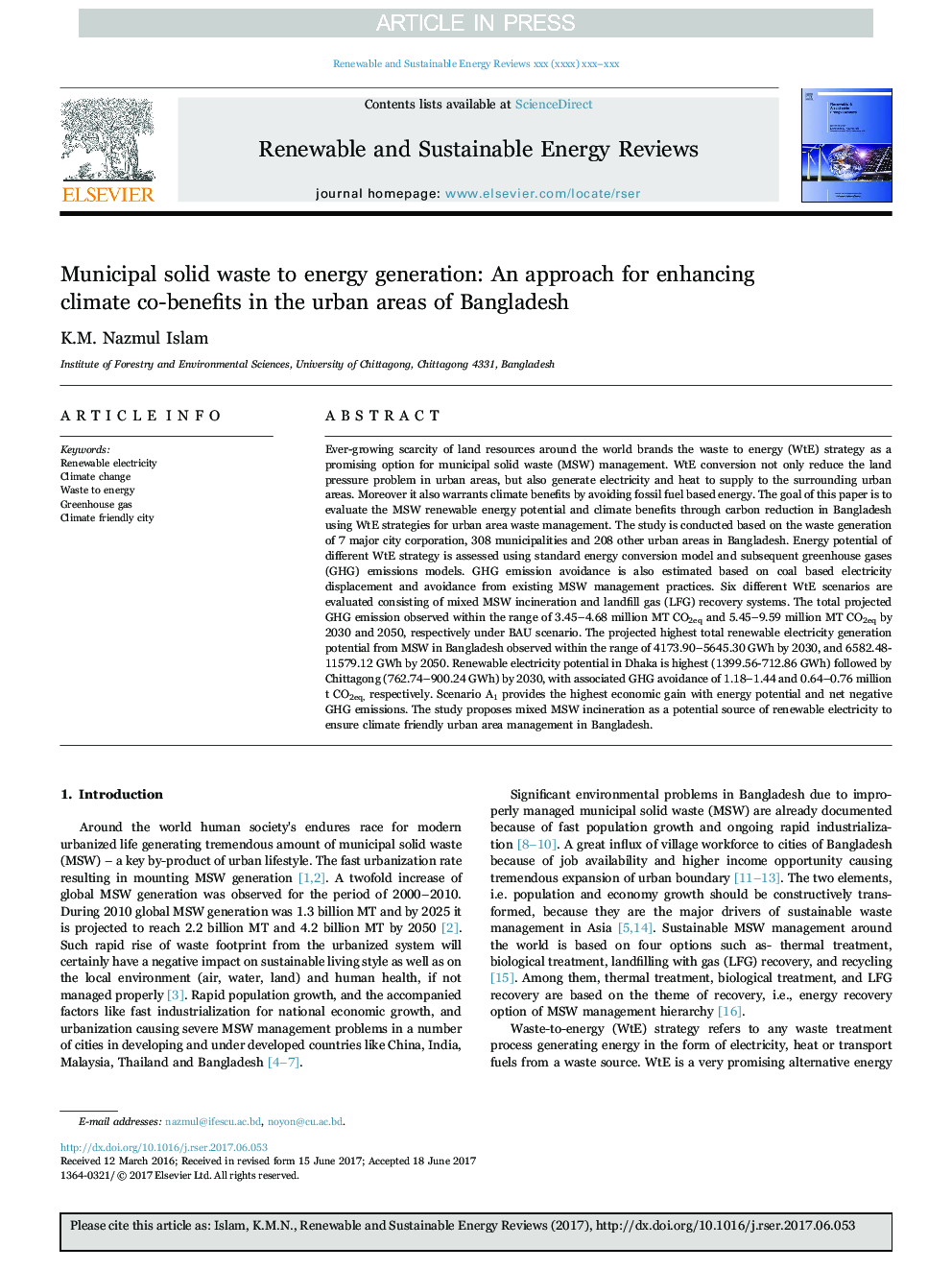| کد مقاله | کد نشریه | سال انتشار | مقاله انگلیسی | نسخه تمام متن |
|---|---|---|---|---|
| 8112349 | 1522305 | 2018 | 15 صفحه PDF | دانلود رایگان |
عنوان انگلیسی مقاله ISI
Municipal solid waste to energy generation: An approach for enhancing climate co-benefits in the urban areas of Bangladesh
ترجمه فارسی عنوان
مواد زائد جامد شهری به تولید انرژی: یک رویکرد برای افزایش آب و هوا، یک منافع مشترک در مناطق شهری بنگلادش
دانلود مقاله + سفارش ترجمه
دانلود مقاله ISI انگلیسی
رایگان برای ایرانیان
کلمات کلیدی
برق قابل تجدید، تغییر آب و هوا، زباله به انرژی، گاز گلخانه ای، شهر هویت سازگار،
موضوعات مرتبط
مهندسی و علوم پایه
مهندسی انرژی
انرژی های تجدید پذیر، توسعه پایدار و محیط زیست
چکیده انگلیسی
Ever-growing scarcity of land resources around the world brands the waste to energy (WtE) strategy as a promising option for municipal solid waste (MSW) management. WtE conversion not only reduce the land pressure problem in urban areas, but also generate electricity and heat to supply to the surrounding urban areas. Moreover it also warrants climate benefits by avoiding fossil fuel based energy. The goal of this paper is to evaluate the MSW renewable energy potential and climate benefits through carbon reduction in Bangladesh using WtE strategies for urban area waste management. The study is conducted based on the waste generation of 7 major city corporation, 308 municipalities and 208 other urban areas in Bangladesh. Energy potential of different WtE strategy is assessed using standard energy conversion model and subsequent greenhouse gases (GHG) emissions models. GHG emission avoidance is also estimated based on coal based electricity displacement and avoidance from existing MSW management practices. Six different WtE scenarios are evaluated consisting of mixed MSW incineration and landfill gas (LFG) recovery systems. The total projected GHG emission observed within the range of 3.45-4.68 million MT CO2eq and 5.45-9.59 million MT CO2eq by 2030 and 2050, respectively under BAU scenario. The projected highest total renewable electricity generation potential from MSW in Bangladesh observed within the range of 4173.90-5645.30Â GWh by 2030, and 6582.48- 11579.12Â GWh by 2050. Renewable electricity potential in Dhaka is highest (1399.56-712.86Â GWh) followed by Chittagong (762.74-900.24 GWh) by 2030, with associated GHG avoidance of 1.18-1.44 and 0.64-0.76 million t CO2eq, respectively. Scenario A1 provides the highest economic gain with energy potential and net negative GHG emissions. The study proposes mixed MSW incineration as a potential source of renewable electricity to ensure climate friendly urban area management in Bangladesh.
ناشر
Database: Elsevier - ScienceDirect (ساینس دایرکت)
Journal: Renewable and Sustainable Energy Reviews - Volume 81, Part 2, January 2018, Pages 2472-2486
Journal: Renewable and Sustainable Energy Reviews - Volume 81, Part 2, January 2018, Pages 2472-2486
نویسندگان
K.M. Nazmul Islam,
